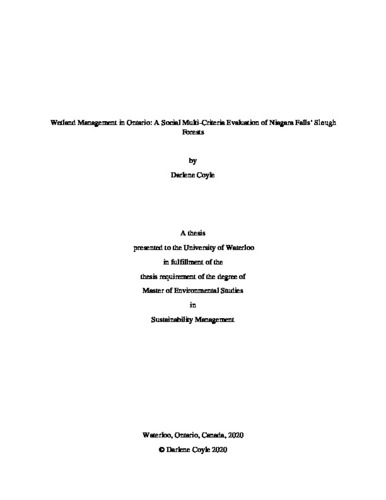| dc.contributor.author | Coyle, Darlene | |
| dc.date.accessioned | 2020-06-18 16:52:41 (GMT) | |
| dc.date.available | 2020-06-18 16:52:41 (GMT) | |
| dc.date.issued | 2020-06-18 | |
| dc.date.submitted | 2020-06-11 | |
| dc.identifier.uri | http://hdl.handle.net/10012/16003 | |
| dc.description.abstract | Wetlands are unique ecosystems that provide a multitude of direct and indirect services to the human population. Yet, these ecosystems continue to be one of the most threatened biomes in the world with unsustainable rates of loss and degradation. To address the social, environmental and economic consequences resulting from the loss of wetland services, several policy frameworks have been developed and implemented at various levels of government around the world. These frameworks have varying degrees of flexibility to balance the need to protect remaining wetlands and pursue economic development. This study examined Ontario’s policies governing wetlands and the competing interests surrounding land use decision-making of wetlands at the local level using a case study of a provincially significant wetland (PSW) in the City of Niagara Falls. A Social Multi-Criteria Evaluation was used to understand the problem surrounding the PSW and act as a decision-making support tool to effectively assess outcomes. Despite a high rate of inconsistency among participant’s responses, the results of the evaluation demonstrated a split desire for complete conservation of the study area and allowing partial development outside the PSW and buffer areas with ownership of the PSWs transferred to a public authority. Therefore, Ontario, which currently relies on a command and control policy approach to wetland management, may benefit from the adoption of market-based policy instruments that seek to balance wetland protection with economic development. However, the type of market instrument appropriate for Ontario will require further study to address inefficiencies highlighted in the current provincial approach and assess public support as some market-based approaches have already demonstrated a lack of public support. | en |
| dc.language.iso | en | en |
| dc.publisher | University of Waterloo | en |
| dc.subject | wetlands | en |
| dc.subject | resource management | en |
| dc.subject | SMCE | en |
| dc.subject | social-multi criteria evaluation | en |
| dc.subject | public policy | en |
| dc.title | Wetland Management in Ontario: A Social Multi-Criteria Evaluation of Niagara Falls’ Slough Forests | en |
| dc.type | Master Thesis | en |
| dc.pending | false | |
| uws-etd.degree.department | School of Environment, Enterprise and Development | en |
| uws-etd.degree.discipline | Sustainability Management | en |
| uws-etd.degree.grantor | University of Waterloo | en |
| uws-etd.degree | Master of Environmental Studies | en |
| uws.contributor.advisor | Thistlethwaite, Jason | |
| uws.contributor.affiliation1 | Faculty of Environment | en |
| uws.published.city | Waterloo | en |
| uws.published.country | Canada | en |
| uws.published.province | Ontario | en |
| uws.typeOfResource | Text | en |
| uws.peerReviewStatus | Unreviewed | en |
| uws.scholarLevel | Graduate | en |

